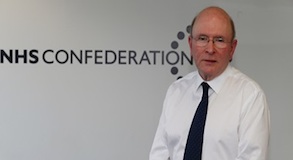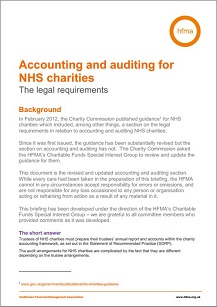News review - November 2017
With October dominated by talk of the need for additional NHS funding and avoiding a winter crisis,Ted Baker stepped out of the shadows to grab the headlines. The new chief inspector of hospitals, who had taken up his new position at the Care Quality Commission in late summer, told the Daily Telegraph the health service was not fit for the 21st century. Professor Baker bemoaned the fact that the NHS had not adapted the care model to reflect changes in demography. Later, in October, the CQC published its annual State of care report, which said the health and care system in England was ‘straining at the seams’. However, quality of care had been maintained despite serious challenges and most people were getting good, safe care.
Professor Baker is particularly concerned about A&E and the latest figures showed the four-hour standard was achieved in 89.7% of patients, compared with 90.3% in August. This meant the NHS narrowly missed its target of returning to 90% by September, with a view to the majority of trusts returning to 95% by the end of the financial year. Combined performance statistics showed delayed transfers of care remained relatively stable over the last year, but waiting lists for elective treatment grew by 3.6%. A joint NHS Digital and NHS England report later said more than 8% of patients who attended A&E returned within seven days in 2016/17.
Despite this, the CQC reported that most patients who attend A&E had positive experiences, though many were concerned about waiting times, discharge arrangements and access to timely pain relief. The CQC surveyed more than 45,000 people who attended A&E departments in England in September 2016. Most had confidence in the quality of care and felt they were treated with respect and dignity. But 29% of those who requested pain medication in a type 1 (major) A&E department said they waited more than 15 minutes to receive it and 7% said they did not receive it at all. More than half said they did not receive comprehensive information about symptoms to watch out for on discharge.
The NHS Confederation said that more than 90% of health and care leaders in England are concerned about how their organisation will cope with pressures this winter. The confederation said that 62% of its members were extremely concerned as they prepared for a more challenging winter period. It was lobbying the government for a comprehensive review of which services should be provided, how much they will cost and how they will be funded.
The Scottish government announced an additional £5m to enhance winter resilience and fund additional staff to help with weekend discharge from hospital. The funding is on top of previously announced £50m to support waiting time performance and £9m for A&E performance. Each territorial health board will receive a share of the additional £5m, based on their target share according to the national funding formula.
NHS England has several strategies to help the service through the winter, including a major campaign on the flu vaccine and GP indemnity against clinical negligence. This winter the indemnity fund for out-of-hours GP services has been doubled to £10m to encourage more family doctors to be available and take pressure off emergency departments.
The Department of Health also unveiled proposals for a state-backed indemnity scheme for general practice in England across all NHS services, not just out of hours. It acknowledged that the cost of clinical negligence cover was a concern to GPs, who – unlike their hospital-based colleagues who are covered by the Clinical Negligence Scheme for Trusts through their NHS employers – must get personal insurance. The Department said it was seeking a more stable and affordable system and would enter discussions with GP representatives and others.
While the indemnity plan aims, in part, to retain GPs, health secretary Jeremy Hunt also announced proposals to recruit GP trainees. He said they will be offered a one-off payment of £20,000 to work in areas where training places have been unfilled for a number of years. Announcing measures on recruitment and retention in general practice alongside the proposed indemnity scheme, he added that the new Targeted Enhanced Recruitment Scheme would begin in 2018. He also announced new flexible working arrangements for GPs considering retirement, new international recruitment and a consultation on physician associate regulation.
Last May’s Wannacry cyber attack affected at least 34% of NHS trusts in England, the National Audit Office said. In a report, the NAO said that computer systems in 603 other NHS organisations were infected, including 595 GP practices. While no NHS organisation paid the ransom, the cost of the attack is not known.
The number of nurses and health visitors has fallen for the first time since 2013 on a year-on-year basis, according to the King’s Fund. There were fewer nurses and health visitors in post in April compared with April 2016 and this pattern continued in May and June. A reduction in the number of nurses from EU countries was a key factor in the fall, the King’s Fund said.
The ending of reciprocal healthcare arrangements between the UK and European Union countries after EU exit, could cost the UK £500m a year, according to the Brexit Health Alliance. Without the European Health Insurance Card (EHIC), patients with existing health problems may not be able to afford the insurance to travel to Europe, it said. And, with no reciprocal arrangements in place, almost 200,000 UK pensioners who live in the EU could have no option but to return to the UK under a no deal exit.
The electronic prescription service has saved the health service £130m over three years, according to NHS Digital. The system, developed by NHS Digital, allows GPs to send prescriptions directly to pharmacies.
The NHS in Wales will receive additional revenue of £230m in 2018/19 and £220m in 2019/20, according to the Welsh government’s draft Budget. Budget documents said the additional funding, together with recurrent revenues, would allow a medium-term approach to service reform and drive improvement in service delivery and outcomes. The funding includes an extra £40m over two years for mental health services, while capital funding would increase by £90m over three years. However, it was estimated that the NHS in Wales could face a £2.5bn funding gap by 2025/26 if funding was maintained in real terms.
Month in quotes
‘One of the things I regret is that 15 or 20 years ago, when we could see the change in the population, the NHS did not change its model of care. It should have done it then – there was a lot more money coming in but we didn’t spend it all on the right things… on transformation of the model of care.’
CQC chief inspector of hospitals Ted Baker tells the Daily Telegraph transformation should have begun in the 1990s
‘NHS organisations will continue to find it hard to meet patient demand and public expectations in the next two years within the budget proposed. One of the biggest challenges facing the NHS is the need to reconfigure services to meet current and future demand and that requires support from politicians, partners and the public.’
Welsh NHS Confederation director Vanessa Young predicts tough years ahead (pictured)
‘Last year it was said that the service was just about coping, but for many of our members this year looks more challenging. Not only is there the prospect of ongoing pressure, high bed occupancy, and delayed transfers of care blockages in flow, but the worry too of a serious flu attack combined with bad weather.’
NHS Confederation chief executive Niall Dickson (pictured) urges the chancellor to revisit health and care funding allocations as he warns of a difficult winter ahead
‘By introducing targeted support for vulnerable areas and tackling head on critical issues such as higher indemnity fees and the recruitment and retention of more doctors, we can strengthen and secure general practice for the future.’
Health secretary Jeremy Hunt on government action to prop up GP numbers
From the hfma
Tower Hamlets and New York State are rarely mentioned in the same sentence, but they have a lot in common, according to Jason Helgerson, Medicaid director for the US state. In a blog on the HFMA website, he wrote that both are trying to bring together health and social care organisations and pledges to work with NHS England to share learning between local innovators in England and New York.
In another blog, head of the HFMA Healthcare Costing for Value Institute Catherine Mitchell said last month’s international symposium demonstrated that value-based healthcare is a practical solution to current challenges. The event showed that health systems are using value to pursue similar goals. But there is no single approach that can be parachuted in to existing, differently structured health systems.
The challenges of system governance in an era of new organisations, such as sustainability and transformation partnerships and accountable care systems, are addressed in a blog by HFMA research manager Lisa Robertson. The HFMA has produced briefings to help, including one on developing robust governance arrangements. This briefing, published in October, includes a diagnostic tool that can identify where good governance arrangements are already in place and where more work is needed. The tool was developed by the HFMA Governance and Audit Committee and can be used to inform board or governing body discussions on governance.
Related content
We are excited to bring you a fun packed Eastern Branch Conference in 2025 over three days.
This event is for those that will benefit from an overview of costing in the NHS or those new to costing and will cover why we cost and the processes.